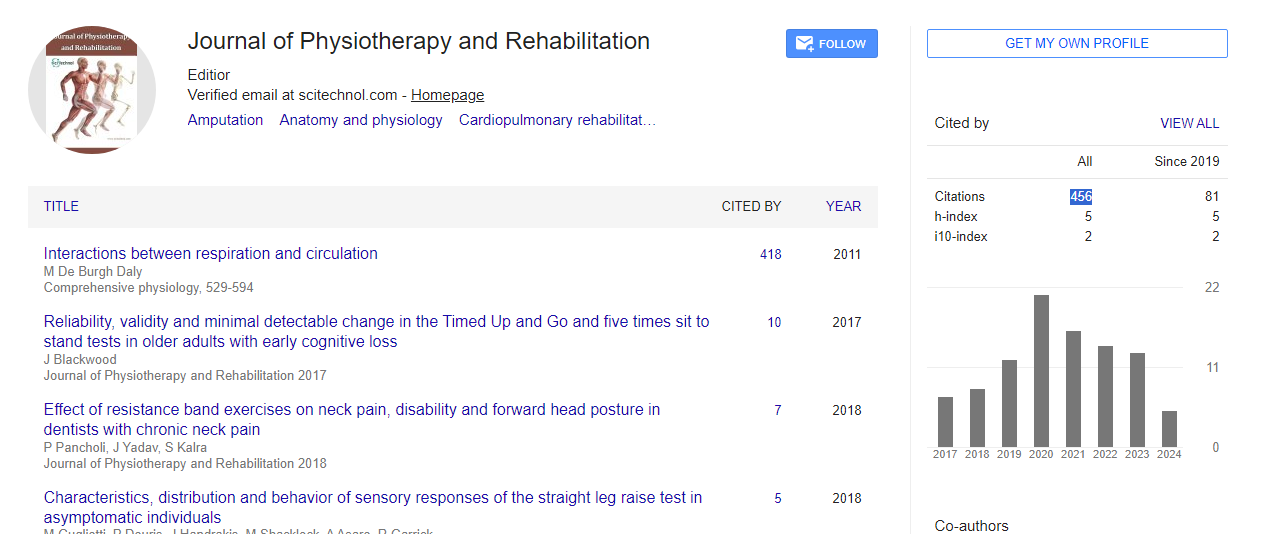Opinion Article, J Physiother Rehabi Vol: 7 Issue: 3
Personal Growth and Recovery through Psychiatric Rehabilitation
Costa Perkins*
1Department of Psychiatry and Psychotherapy, Freiburg University Medical Centre, Freiburg, Germany
*Corresponding Author: Costa Perkins,
Department of Psychiatry and
Psychotherapy, Freiburg University Medical Centre, Freiburg, Germany
E-mail: costperk@psy.fmc.uni-freiburg.de
Received date: 22 May, 2023, Manuscript No. JPTR-23-104288;
Editor assigned date: 25 May, 2023, Pre QC. JPTR-23-104288 (PQ);
Reviewed date: 08 June, 2023, QC No. JPTR-23-104288;
Revised date: 15 June, 2023, Manuscript No. JPTR-23-104288 (R);
Published date: 22 June, 2023, DOI: 10.4172/JPTR.1000134
Citation: Perkins C (2023) Personal Growth and Recovery through Psychiatric Rehabilitation. J Physiother Rehabi 7:3.
Description
Psychiatric rehabilitation plays a vital role in supporting individuals with mental health conditions in their personal growth and recovery journey. This comprehensive approach focuses on enhancing the individual's abilities, independence and overall well-being. By providing a range of supportive services, psychiatric rehabilitation aims to empower individuals to regain control over their lives and reintegrate into society.
Understanding psychiatric rehabilitation
This section provides an overview of psychiatric rehabilitation, explaining its purpose, principles and core components. It highlights the collaborative nature of the rehabilitation process, involving mental health professionals, individuals with lived experiences and their support networks. The focus is on creating an individualized plan that addresses specific needs and goals, fostering personal growth and recovery.
Holistic assessment and goal setting: An important aspect of psychiatric rehabilitation is conducting a holistic assessment to identify the strengths, challenges and aspirations of individuals. This section explores the assessment process and its role in developing personalized rehabilitation plans. It emphasizes the importance of setting realistic and meaningful goals that align with the individual's values and aspirations.
Skill development and training: Psychiatric rehabilitation focuses on enhancing skills necessary for individuals to navigate various aspects of their lives. This section explores the diverse range of skills targeted, such as communication, problem-solving, coping mechanisms and social interaction. It highlights the role of psycho-education, vocational training and life skills development in supporting personal growth and recovery.
Psychosocial interventions and support: Psychiatric rehabilitation encompasses various psychosocial interventions aimed at addressing the emotional, social and psychological needs of individuals. This section discusses the importance of therapeutic interventions, such as individual counseling, group therapy and peer support programs. It emphasizes the role of these interventions in fostering personal growth, building resilience and establishing meaningful connections with others.
Community integration and inclusion: Recovery in psychiatric rehabilitation extends beyond individual progress and emphasizes community integration and inclusion. This section explores the significance of community-based programs, social support networks and participation in meaningful activities. It highlights the role of these factors in reducing stigma, promoting social interaction and enhancing overall well-being.
Empowerment and self-advocacy: Psychiatric rehabilitation places a strong emphasis on empowering individuals to become active participants in their own recovery. This section explores strategies to foster self-advocacy skills, encourage self-determination and promote personal responsibility. It highlights the importance of individuals taking ownership of their recovery journey and making informed decisions regarding their mental health care.
On-going support and relapse prevention: Sustaining personal growth and recovery requires on-going support and relapse prevention strategies. This section discusses the role of aftercare services, followup assessments and relapse prevention plans. It emphasizes the importance of a collaborative and long-term approach to ensure continued progress and maintenance of well-being.
Conclusion
Psychiatric rehabilitation offers a comprehensive framework for individuals to achieve personal growth and recovery in the context of mental health conditions. By addressing various aspects of an individual's life, including skills development, psychosocial interventions, community integration and empowerment, psychiatric rehabilitation facilitates personal transformation and enhances overall well-being. With the right support, individuals can navigate their recovery journey, regain control and lead fulfilling lives.
 Spanish
Spanish  Chinese
Chinese  Russian
Russian  German
German  French
French  Japanese
Japanese  Portuguese
Portuguese  Hindi
Hindi 